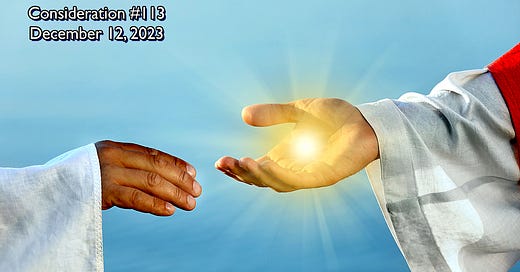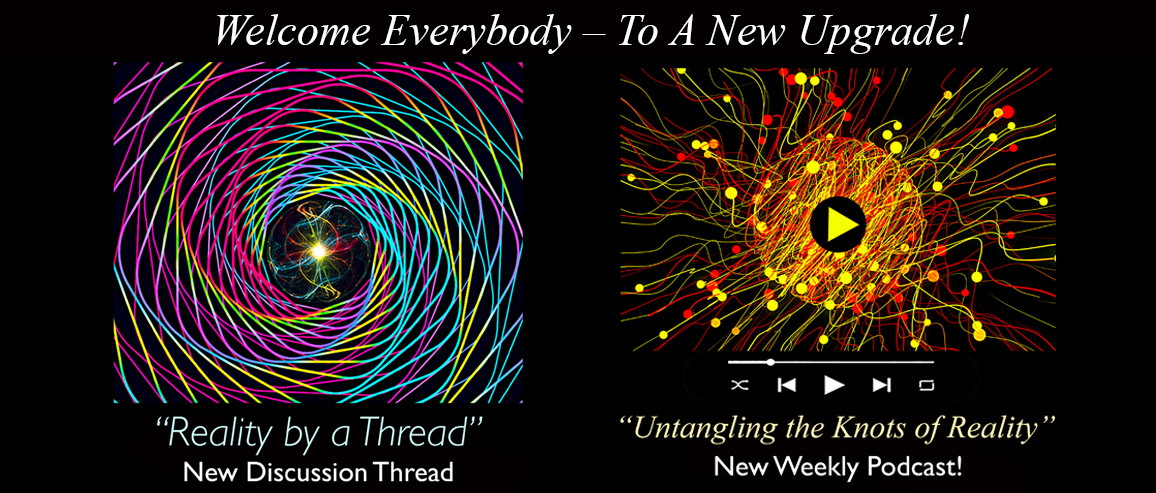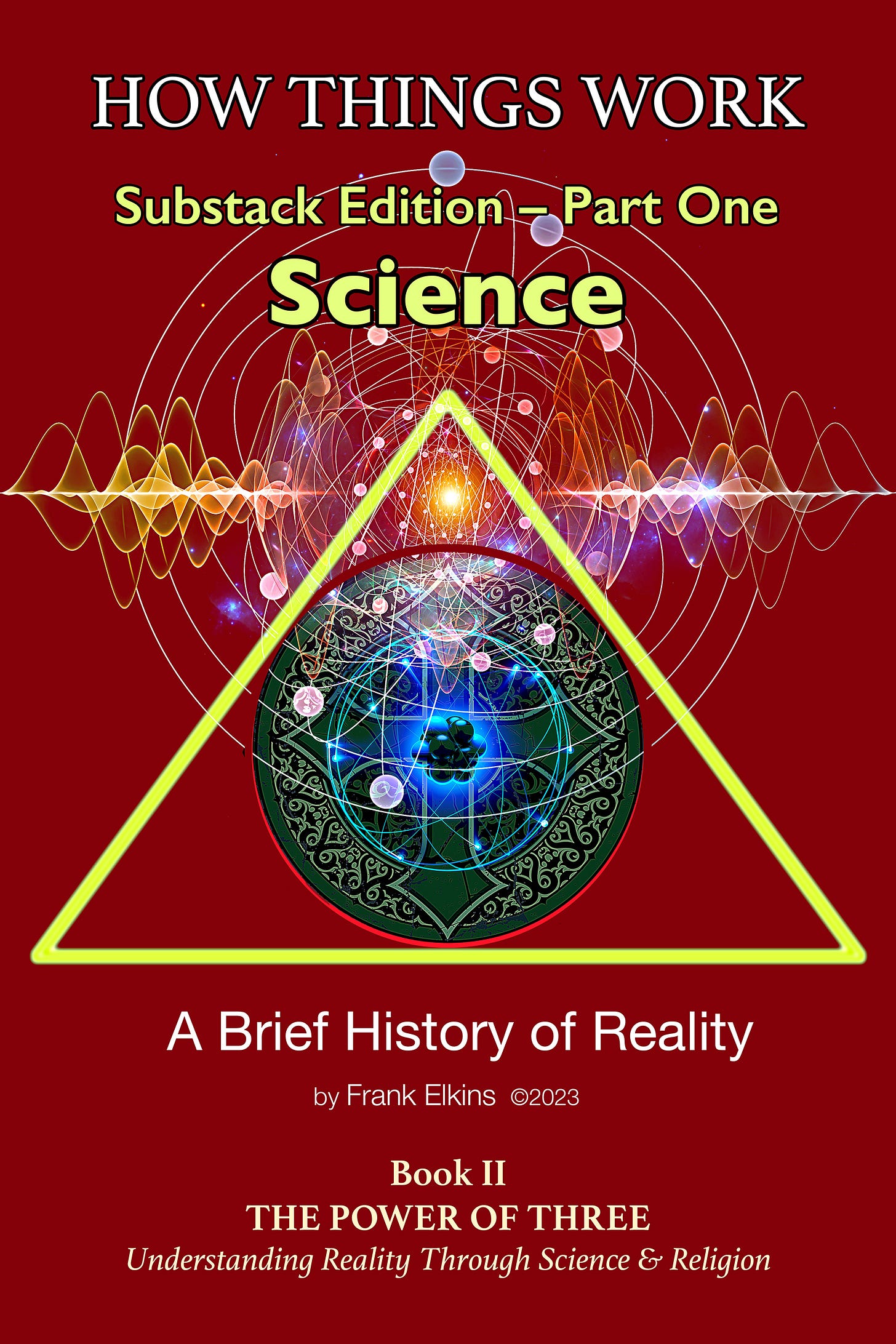How Things Work: A Brief History of Reality
BOOK II: The Power of Three (Science & Religion) – Consideration #113. "The Miracles of Jesus"
Be A Part of the Conversation!
Tuesday December 12, 2023
“Catching the apple doesn't overturn the law of gravity or the formulation of a new law. It's merely an intervention of a person with freewill who overrides the natural causes operative in that particular circumstance. And that is, essentially, is what God does when he causes a miracle to occur.”
― William Lane Craig
FOREWORD
One of the things that separates science from religion is the concept of miracles. There are essentially three possible considerations regarding this subject. First, there is no such thing as a miracle; they are empirically impossible. This is the traditional scientific perspective. Second, spiritual reality is not limited by empirical reality; anything is possible. This is the traditional religious perspective. The third consideration is that miracles are a natural part of empirical reality that we don’t yet fully understand; therefore, a natural part of the universe that we simply do not recognize at this time. This perspective can be logically incorporated into either a scientific or religious perspective.
Most religions reflect a belief in miracles; many are founded on them. Islam, for example, believes that the revelation of the Quran is a miracle; considered by Muslims to be the greatest miracle possible. Eastern religions, such as Buddhism, also consider miracles to be a “natural” part of spirituality:
“Thomas Aquanis defined a miracle as ‘whatever God does outside and beyond the order commonly determined or observed in nature’. Buddhism would agree with this definition except that it would replace the word 'God' with the word 'mind'. The development and purification of the mind through ethical and meditational training can unleash powers not normally apparent which would usually be described as miraculous. The miraculous powers (abhinna iddhi /siddhi) often mentioned in the Buddhist scriptures, and sometimes manifested by the Buddha himself, include being able to multiply oneself, fly through the air, hear things over a long distance, read other people's minds, remember one's former lives and know how to destroy the defilements of the mind. Only the last three of these is considered to be important.”
Buddhanet.net – Glossary of Buddhist terms: “Miracles”
In the Judeo-Christian tradition, December marks a month celebrating the acceptance of miracles. Hanukkah is the Jewish celebration of a miracle related to the Maccabean Revolt in the 2nd century BCE involving the retaking of Jerusalem and the rededication of the “second” Jewish temple. Christmas is the Christian celebration reflecting the miracle of Jesus’ birth. Therefore, it is perhaps serendipitous that we are considering the miracles of Jesus this month.
PREFACE
Happy Holidays Everybody!
For many people, the miracles recorded in the New Testament do not reflect the most important aspect of Jesus’ message or ministry. Without the miracles, they would still consider Jesus to be perhaps the most influential person in Western history, if not world history. Many others find these miracles, including the resurrection, to be the most difficult part of Jesus’ narrative to accept. However, in terms of the Biblical narrative, the miracles of Jesus play an integral role in understanding the Kingdom of Heaven.
The miracles of Jesus empirically demonstrate the three essential rational concepts of faith, the forgiveness of sins, and the Kingdom of Heaven.
CONSIDERATION #113: The Miracles of Jesus
In Matthew, Jesus comes down from the mountain after the Sermon on the Mount and is followed by even larger crowds. This marks the beginning of Jesus’ public healing and miracles. Depending on how and what you count, there are over twenty miracles in the Gospel of Matthew.
“When Jesus came down from the mountainside, large crowds followed him. A man with leprosy came and knelt before him and said, ‘Lord, if you are willing, you can make me clean.’”
Matthew 8:1-2
A key element of this encounter is that the man seeking the miracle does not demand anything from Jesus. What he says to Jesus is actually a proclamation of faith; stating that he “knows” Jesus can heal him if Jesus is willing. Jesus responds that he is.
“Jesus reached out his hand and touched the man. ‘I am willing,’ he said. ‘Be clean!’” Immediately he was cleansed of his leprosy.
Matthew 8:3
After healing the man with leprosy, Jesus cautions him not to tell anyone about what had happened. This is a consistent message from Jesus after many healings. Perhaps, because it was dangerous for him. However, he also expects that the man should follow the law of Moses in giving thanks for the blessing from God. Once again establishing that he is not trying to dismantle the laws of Moses.
“Then Jesus said to him, ‘See that you don’t tell anyone. But go, show yourself to the priest and offer the gift Moses commanded, as a testimony to them.’”
Matthew 8:4
Many of Jesus’ miracles and healings occur among small gatherings, some not even done in pubic at all. One clear example of this is demonstrated in a healing based on the faith of a Gentile (non-Jewish). Arriving at the town of Capernaum, Jesus was approached by a Roman Centurion, seeking help for his servant.
“When Jesus had entered Capernaum, a centurion came to him, asking for help. ‘Lord,’ he said, ‘my servant lies at home paralyzed, suffering terribly.’”
Matthew 8:5-6
First, this is a Roman Centurion. Rome is the occupying force in Jerusalem. For many Jews, the role of the Messiah was to rid Jerusalem of this occupying force. However, Jesus agrees to come to the aid of his occupier. The Centurion also strays from expectations, by subjugating himself before this subservient Jew and asking for his help.
But perhaps the most enlightening aspect of this story is that the Centurion is seeking this help for his servant. Seeing his faith, and his commitment to a servant, Jesus agrees to help him.
“Jesus said to him, ‘Shall I come and heal him?’”
Matthew 8:7
What happens next is what makes this story so exceptional. The Centurion’s faith in Jesus’ ability to heal his servant is so strong, he knows that it is not necessary for Jesus to come to his house, all Jesus need do is speak the words and his servant will be healed; publicly recognizing Jesus’ authority.
“The centurion replied, ‘Lord, I do not deserve to have you come under my roof. But just say the word, and my servant will be healed. For I myself am a man under authority, with soldiers under me. I tell this one, ‘Go,’ and he goes; and that one, ‘Come,’ and he comes. I say to my servant, ‘Do this,’ and he does it.”
Matthew 8:8-9
When Jesus hears the response from the Centurion, he is amazed. Nowhere had he seen such faith among his own people. He admonishes the Jews, and in that admonition, reveals that although the Jews are the chosen people, their connection to Abraham is not enough.
The “new covenant” would be a covenant with all human beings who are truly faithful and pure of heart, not just the Jews. Having a “connection” to Abraham and Moses was not enough to save you from an impure heart.
“When Jesus heard this, he was amazed and said to those following him, ‘Truly I tell you, I have not found anyone in Israel with such great faith. I say to you that many will come from the east and the west, and will take their places at the feast with Abraham, Isaac and Jacob in the kingdom of heaven. But the subjects of the kingdom will be thrown outside, into the darkness, where there will be weeping and gnashing of teeth.’”
Matthew 8:18-12
Jesus’ final words to the Centurion reflect a common refrain regarding his healings; the key to the miracle is just as connected to the person’s faith as it is to Jesus’ actions.
“Then Jesus said to the centurion, ‘Go! Let it be done just as you believed it would.’ And his servant was healed at that moment.”
Matthew 8:13
In this story, no one actually sees the miracle of healing taking place; it is reported to them by others who were there with the servant at the time. They do, however, witness the miracle and power of faith as demonstrated through both Jesus and the Centurion.
However, there were times when Jesus would not perform miracles. Specifically, when those seeking them sought them as proof of his authority, as opposed to an expression of their faith.
The Pharisees and Sadducees came to Jesus and tested him by asking him to show them a sign from heaven.
He replied, “When evening comes, you say, ‘It will be fair weather, for the sky is red,’ and in the morning, ‘Today it will be stormy, for the sky is red and overcast.’ You know how to interpret the appearance of the sky, but you cannot interpret the signs of the times. A wicked and adulterous generation looks for a sign, but none will be given it except the sign of Jonah.” Jesus then left them and went away.
Matthew 16:2-4
Jesus’ reference to “the sign of Jonah” is a direct prophecy of his death and resurrection. Just as Jonah was in the belly of a whale for three days before returning to life, so Jesus would be crucified and lie three days in a tomb before being resurrected. This prophecy, based on the Old Testament, is the only sign Jesus offers them.
For Matthew, all of Jesus’ miracles were a sign.
When evening came, many who were demon-possessed were brought to him, and he drove out the spirits with a word and healed all the sick. This was to fulfill what was spoken through the prophet Isaiah:
“He took up our infirmities and bore our diseases.”
Matthew 8:16-17
Jesus performs many miracles and healings in Matthew including healing the sick, the blind, the paralyzed, casting out demons, feeding the multitudes with two fish and five loaves of bread, walking on water, and even raising a young girl from the dead. However, the real miracle in these stories is not the healing itself, it is the faith of those seeking the miracle.
In Matthew, Jesus makes a direct connection to his performance of miracles and the Kingdom of Heaven, or the Kingdom of God. You may also recognize it as Abraham Lincoln’s “House Divided” speech from 1858:
“Then a demon-oppressed man who was blind and mute was brought to him, and he healed him, so that the man spoke and saw. And all the people were amazed, and said, “Can this be the Son of David?”
But when the Pharisees heard it, they said, “It is only by Beelzebul, the prince of demons, that this man casts out demons.”
Knowing their thoughts, he said to them, “Every kingdom divided against itself is laid waste, and no city or house divided against itself will stand. And if Satan casts out Satan, he is divided against himself. How then will his kingdom stand?
… But if it is by the Spirit of God that I cast out demons, then the kingdom of God has come upon you… Therefore I tell you, every sin and blasphemy will be forgiven people, but the blasphemy against the Spirit will not be forgiven…”
Matthew 12: 22-31
Later, in the Gospel of Luke, Jesus reaffirms the essential distinction between the empirical world and the Kingdom of Heaven:
“But he said, ‘What is impossible with man is possible with God.’”
Luke 18:27
POSTSCRIPT
It is often overlooked, or forgotten, that Jesus clearly states that the ability to perform miracles is not unique to him; anyone, with enough faith to experience the Kingdom of Heaven, also had access to that power:
“Truly, truly, I say to you, whoever believes in me will also do the works that I do; and greater works than these will he do…”
John 14:12
The real proof that miracles are not limited to Jesus is demonstrated when he sends the Apostles into the world to perform miracles and heal the sick. In Matthew, Jesus sends the twelve Apostles into the world with instructions, advice, and a warning.
Being a “Jewish” Messiah, Jesus maintains God’s covenant with Abraham by instructing the Apostles to first go to the lost sheep of Israel; offering them the first opportunity to embrace the “good news” of the “new covenant.” For the first time, Jesus encourages the apostles to share the previously hidden secrets of the Kingdom openly among the people.
“Jesus called his twelve disciples to him and gave them authority to drive out impure spirits and to heal every disease and sickness…
These twelve Jesus sent out with the following instructions: “Do not go among the Gentiles or enter any town of the Samaritans. Go rather to the lost sheep of Israel. As you go, proclaim this message: ‘The kingdom of heaven has come near.’ Heal the sick, raise the dead, cleanse those who have leprosy, drive out demons. Freely you have received; freely give…”
Matthew 10:1-8
Essentially, the authority to perform miracles and forgive sins is part of transitioning from an empirical experience of reality to the Kingdom of Heaven. All human beings “potentially” have this power and authority.
Next week a Special Edition Newsletter considering the “illusion” of political parties in terms of Rationalism and Empiricism…
This Week on “The Thread”…
UPGRADE NOW!
Excerpt From This Week’s Special Edition “Year in Review” PODCAST - Part 2 “…
Expand the Conversation by Upgrading to “Reality by a Thread!”
• UNTANGLING THE KNOTS OF REALITY: Year in Review Special Podcast Part-2 “Untangling the Social Contract” – Podcasts #39-#43 & #49-#51
(The second part in a review and synopsis of this year’s podcasts including Social Contract Theory, the birth of America, the Civil War, the Civil Rights Movement, and more...)
• REALITY BY A THREAD: Short Story Preview (The Genocide Mosquito – Part 2 ) “Scientists and researchers continued to improve the DMs until they became the paradigm of sophisticated Artificial Intelligence technology. By the production of the AIDM-3 virtually any medical test, including DNA testing, was possible without anyone knowing it had ever taken place. In addition, many ‘treatments’ could be administered directly upon the determination of the test, which was essentially instantaneous.”
• FREE PDF Downloads of Book IV: “The Cosmic Symphony – Overtones of String Theory” plus other Free Books, Discounts and Benefits. Also Gain Complete Access to all Previous Podcasts and Threads!
UPGRADE NOW!
CLICK IMAGE to view the New 2023 Holiday Catalog of Exclusive Unique Gifts!
Now Available!
Available Now!








